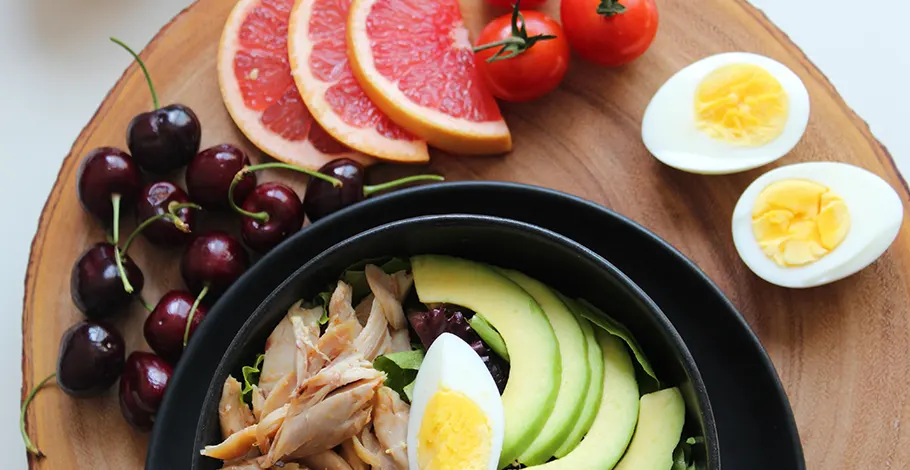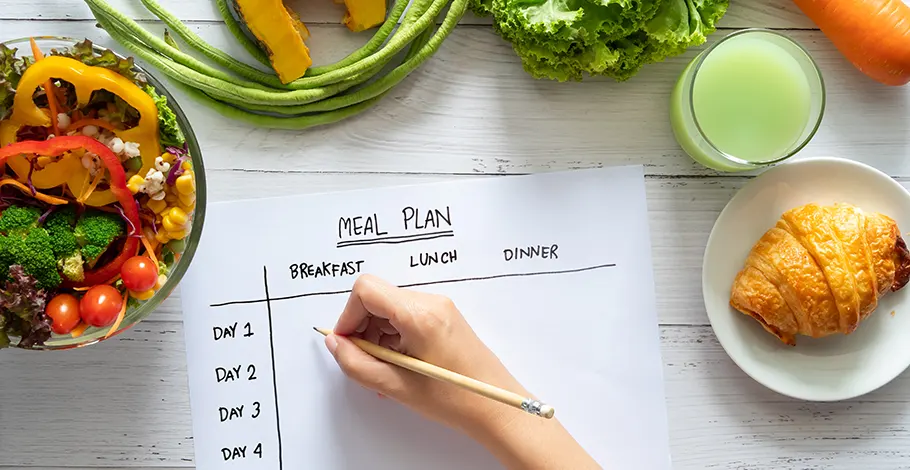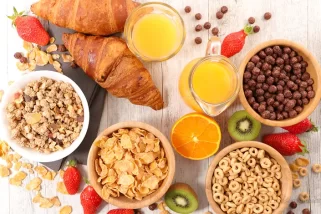Embarking on the journey towards a healthier weight involves choosing the right foods, a cornerstone of which is healthy weight loss foods. These foods not only aid in shedding excess weight but also promote overall well-being.

By incorporating nutrient-rich options like lean proteins and legumes, individuals can manage weight effectively while supporting their overall health. However, it's crucial to approach weight loss mindfully and consult with a healthcare professional before making significant dietary changes.
These foods serve as potent allies, providing essential nutrients that fuel vitality and aid in weight management. Understanding that achieving optimal health is multifaceted, it's important to consider individual needs. Through informed choices and a focus on nourishing the body with wholesome options, individuals pave the way for a healthier, more vibrant future. In essence, healthy weight loss foods empower individuals on their journey to improved health and a trimmer waistline, fostering sustainable wellness and vitality.
Incorporating Whole Foods
- Fruits and Vegetables: These nutritional powerhouses are low in calories and high in essential vitamins, minerals, and fiber, making them indispensable in any weight loss diet. Incorporating a variety of colorful fruits and vegetables ensures a broad spectrum of nutrients essential for optimal health.
- Whole Grains: Opting for whole grains over refined grains provides sustained energy and keeps you feeling fuller for longer periods. Whole grains like quinoa, brown rice, and oats are rich in fiber and complex carbohydrates, promoting satiety and aiding in weight loss.
Lean Proteins for Sustained Energy

Lean Protein Sources in Your Meals. Shutterstock Image
- Importance of Protein: Including lean protein sources in your meals not only supports muscle growth and repair but also helps regulate appetite and boost metabolism, contributing to effective weight loss. Research suggests that higher protein diets can lead to greater weight loss and fat loss.[1]
- Sources of Lean Proteins:
Incorporate lean protein options such as chicken breast, turkey, fish, tofu, and legumes into your diet. These protein sources are low in saturated fat and calories, making them ideal for weight management. Legumes, such as beans and lentils, are particularly beneficial as they are high in protein and fiber, promoting fullness and aiding in weight loss.
Leafy Greens and Cruciferous Vegetables
-
Leafy greens and cruciferous vegetables are staples for healthy weight loss journeys. Packed with vitamins, minerals, and fiber, they offer low-calorie options that keep you full longer, aiding in calorie control.Incorporating these healthy weight loss foods into your diet can enhance your journey to a fitter, healthier you.[2]
- Sources:
Leafy greens like spinach, kale, and Swiss chard, as well as cruciferous vegetables such as broccoli, cauliflower, and Brussels sprouts, are low in calories but high in fiber, vitamins, and minerals. These vegetables can be incorporated into salads, stir-fries, soups, and smoothies to add volume and nutritional value to your meals while supporting weight loss efforts.
Healthy Fats for Balance and Flavor
- Role of Healthy Fats: Contrary to popular belief, healthy fats are an essential component of a balanced diet and can aid in weight loss when consumed in moderation. They provide satiety, support cell function, and aid in nutrient absorption.
- Sources of Healthy Fats: Avocado, nuts, seeds, and olive oil are excellent sources of healthy fats. Incorporating these into your meals adds flavor and richness while promoting heart health and aiding in weight loss. Nuts and seeds, such as almonds, walnuts, chia seeds, and flaxseeds, are rich in omega-3 fatty acids and other beneficial nutrients, making them a valuable addition to any weight loss diet. Research from the Academy of Nutrition and Dietetics reinforces this notion, emphasizing the importance of choosing healthy fats for optimal health. According to a study published by the Academy, selecting sources of healthy fats, such as those recommended by the organization, can significantly improve dietary quality and support weight management efforts.[3]
Smart Snacking Choices

Nutritious Snacks. Shutterstock Image
- Strategies for Curbing Cravings: Snacking mindfully can prevent overeating and support weight loss goals. Opt for nutrient-dense snacks that provide sustained energy and keep hunger at bay between meals.
- Nutritious Snack Options: Consider incorporating nutrient-dense snacks into your daily routine. Greek yogurt paired with fresh berries offers a satisfying blend of protein, probiotics, and antioxidants. Another nutritious option is hummus with crisp veggie sticks, providing a balance of fiber, healthy fats, and vitamins. Additionally, air-popped popcorn is a satisfying and low-calorie snack that offers whole grain goodness and can help stave off hunger pangs.
By choosing these wholesome snack options, you can nourish your body while satisfying cravings in a healthful way. Remember to pay attention to portion sizes and enjoy your snacks mindfully to fully appreciate their flavors and benefits.
Hydration and Its Impact on Weight Loss
- Importance of Staying Hydrated: Adequate hydration is crucial for overall health and can aid in weight loss by promoting satiety, enhancing metabolism, and reducing calorie intake.
- Hydrating Foods and Beverages: Water, herbal teas, and fruits and vegetables with high water content such as cucumber and watermelon are excellent choices to stay hydrated and support weight loss efforts.
Mindful Eating Practices
- Paying Attention to Hunger Cues: Listening to your body's hunger and fullness signals can prevent overeating and promote weight loss. Eat slowly and savor each bite, allowing yourself to fully enjoy the flavors and textures of your food.
Portion Control Strategies: Use smaller plates, measure serving sizes, and be mindful of portion sizes to prevent overconsumption of calories.
Speaking about to begin establishing a healthy protocol in diet, Clinical Nutrition Specialist Gina dos Santos Hilte suggests that it’s important to slow down, find a moment of relaxation before you eat, chew, eat slowly and enjoy your meals. Laying down the foreground with these mindful practices will pave the way to make sound choices in the future and will also ensure that you absorb what nutrients your food as to offer you.
Meal Planning and Preparation Tips

Balanced Meal Planning. Shutterstock Image
- Benefits of Meal Planning: Planning meals in advance can save time, reduce food waste, and ensure that you make nutritious choices that support your weight loss goals.
- Building Balanced Meals: Aim to include a combination of lean proteins, whole grains, healthy fats, and plenty of fruits and vegetables in each meal to create balanced and satisfying dishes.
Eating Out and Making Healthier Choices
- Strategies for Dining Out: When dining out, look for healthier options on the menu, such as grilled or steamed dishes, salads with lean protein, and vegetable-based soups.
- Portion Control and Moderation: Practice portion control when eating out by splitting meals, opting for smaller portions, or saving half for later to avoid overeating. Research suggests that implementing such strategies can contribute to better weight management and overall health outcomes.[4]
Conclusion
On sharing golden tip for a successful weight loss journey, certified personal trainer Andrew Peak expressed that no matter what type of food one eat, the most important factor in a successful and sustainable weight loss journey is consistent adherence to the formula. Create a programme that can be realistically followed and stick to, and the one will be successful.
Incorporating healthy weight loss foods into your diet can not only help you shed unwanted pounds but also improve your overall health and well-being. By choosing nutrient-dense foods, practicing portion control, and staying hydrated, you can achieve sustainable weight loss and enjoy a healthier lifestyle. Remember, small changes add up over time, so start making healthier choices today for a happier and healthier tomorrow.
4 Sources
We review published medical research in respected scientific journals to arrive at our conclusions about a product or health topic. This ensures the highest standard of scientific accuracy.
[2] Best Vegetables For Weight Loss: https://www.ehproject.org/nutrition/weight-management/best-vegetables-for-weight-loss
[3] Choose Healthy Fats: https://www.eatright.org/food/food-groups/fats/choose-healthy-fats
[4] Strategies for and Barriers to Managing Weight When Eating at Restaurants: https://www.ncbi.nlm.nih.gov/pmc/articles/PMC2879992/







 This article changed my life!
This article changed my life! This article was informative.
This article was informative. I have a medical question.
I have a medical question.
 This article contains incorrect information.
This article contains incorrect information. This article doesn’t have the information I’m looking for.
This article doesn’t have the information I’m looking for.